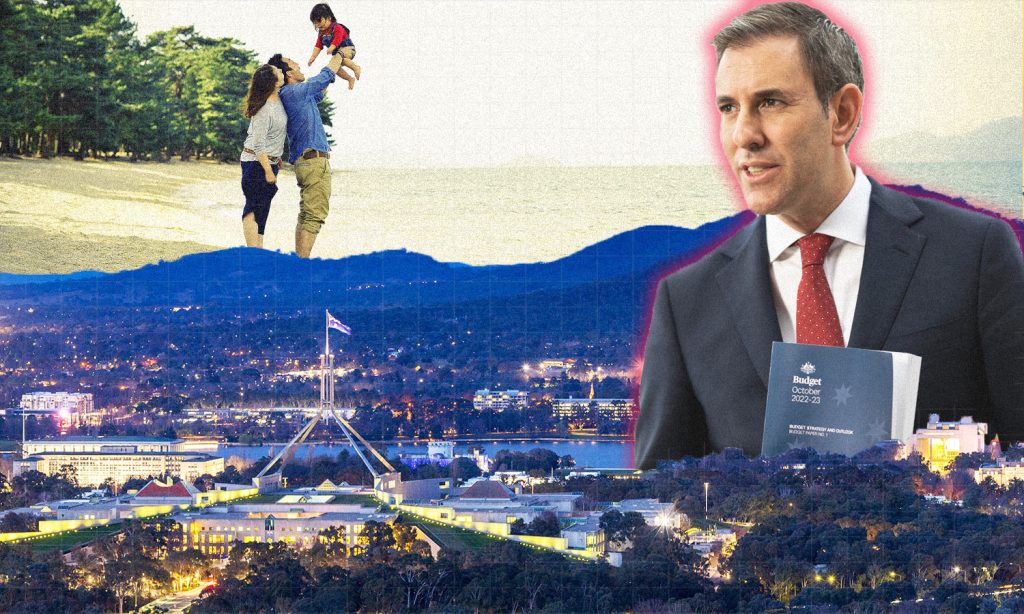Labor’s first federal budget in nearly a decade has a number of key policies designed to fulfil election promises of greater support for parents.
Increasing childcare coverage for 96% of families is a key measure that Treasurer Jim Chalmers has made one of the centrepieces of his 2022-2023 economic plan. He’s also expanded paid parental leave to 26 weeks in measures that will be introduced in stages over the next four years.
“This is about greater equality and greater security for Australian women — and more dads doing their bit,” Chalmers said.
“It’s about participation and productivity — and that’s what makes it economic reform”.
The three “primary objectives” of the budget that Labor has laid out are: “responsible cost of living relief, strengthening the economy, and beginning the hard yards of budget repair,” according to Chalmers.
He’s clearly playing this one with the expectation of successive years in government, saying that it will “lay the foundations of a stronger, more resilient economy” and that it will “do more than batten the hatches against global uncertainty.”
Here’s what Labor is offering parents:
Paid Parental Leave Increase
Some of the big headlines pieces of the budget have already been announced and one of the biggest is the increase in paid parental leave.
“Tonight, our Labor Government delivers the biggest expansion to Paid Parental Leave since its creation,” Chalmers said.
Labor has said that they will increase paid parental leave in Australia by six weeks, taking it up to 26 weeks. The scheme however won’t be fully implemented by 2026, with an additional two weeks being added each year until then.
The policy is aimed at tackling the gender pay gap and the unpaid labour gap carried out by women in this country. The leave can be shared equally between partners and is paid at the minimum wage.
New Childcare Subsidies
Labor campaigned on making childcare cheaper for Aussies and now they’ve committed to doing just that. This is another policy that has been announced prior to the budget.
“Cheaper child care is a game-changing investment in families, our workforce, and our economy,” Chalmers said.
The new policy will cover 90% of the cost of childcare for families earning up to $80,000 a year.
For every $5,000 earned above this, the coverage will drop by 1%, up to a combined income of $530,000.
The policy is set to take effect from July next year and will cost an estimated $5.1 billion. However, Labor have previously said that the policy will benefit 96% of working families and will help an estimated 37,000 full-time workers return to work after having a baby.
Support for New and Expecting Parents
The government is set to create a new national network of perinatal mental health and wellbeing centres, they have announced.
Twelve centres across Australia will be established to provide psychological counselling services to new and expecting parents.
In addition, families bereaved by stillbirth will get an extra $13.9 million in extra support services, including free hospital transport costs and extra perinatal loss care workers.
Free TAFE and More University Courses
$1 billion will be invested into free TAFE and vocational education places.
This one is aimed at parents with older children and seeks to help cover the costs of higher education.
Starting from 2023, 180,000 places will be made available “in areas of highest skills need,” budget papers state.
In addition, nearly $500 million is being spent over the next four years to “strengthen Australia’s university system.”
This will include funding for an additional 20,000 Commonwealth-supported places at higher education centres from 2023 onwards. These are targeted at people from rural and remote areas, Indigenous people, and those whose family members have never been to university before.
The government is targeting these places to fix skills shortages in the country, with “more nurses, pharmacists and other health workers” a key priority.
We’re Finally Teaching Consent
So long, milkshakes. The government is committing $65.3 million over four years to invest in “respectful relationships education.”
This will be ” age-appropriate and evidence-based consent education” taught to primary and secondary school pupils, with investment going to teacher training and external education partners.
A new National Respectful Relationships Education Expert Group will be established to perform a “rapid review” of current consent-based sexual education to identify key areas of need and develop a framework for accrediting external providers of educational
programs.
We presume Chanel Contos will be high on the list of candidates for this expert group.
Click here for our full coverage of what Labor’s budget means for mental health, climate change, and the cost of living.
Read more stories from The Latch and subscribe to our email newsletter.







